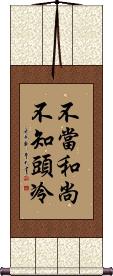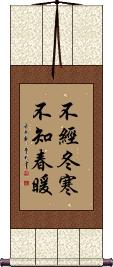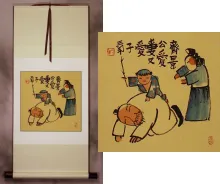Many custom options...
And formats...

The name Must in Chinese / Japanese...
Buy a Must calligraphy wall scroll here!
Personalize your custom “Must” project by clicking the button next to your favorite “Must” title below...
To Know Hardship, One Must Experience It
不當和尚不知頭冷 is a Chinese proverb that literally translates as: [One who has] not been a monk [does] not know [the feeling of a] cold head.
I need to explain that a Chinese Buddhist monk always has a shaved head, and thus a cold head in winter.
Figuratively, this means: One cannot know the true meaning of hardship until one has experienced it oneself.
This is an idiom in Chinese, so the figurative meaning is what people perceive when they hear or read this phrase. Just as in English, when someone says, "The grass is always greener," one will think about the idea of jealousy, rather than the quality of one’s lawn.
You must endure a harsh winter to appreciate the warmth of springtime
You must know hardship to appreciate happiness
This literally translates as: Without having experienced the cold of winter, one cannot appreciate the warmth of spring.
Figuratively, this means: One cannot truly appreciate happiness without having gone through hardship.
There are many contrasts in life. One simply cannot fully know what joy is without having experienced misery, difficulty, and pain. How could you explain “light” if you did not have “darkness” to compare it to?
Embrace hardship, as it makes the good times seem even better.
This in-stock artwork might be what you are looking for, and ships right away...
Gallery Price: $60.00
Your Price: $36.88
Gallery Price: $61.00
Your Price: $33.88
Gallery Price: $61.00
Your Price: $33.88
Gallery Price: $72.00
Your Price: $39.88
These search terms might be related to Must:
Active Duty
Active Duty Military
Call of Duty
Drinking the Water of a Well: One Should Never Forget Who Dug It
Duty / Responsibility / Obligation
Duty to Defend and Protect Country
Loyalty to Duty or Master
Not the results for must that you were looking for?
Below are some entries from our dictionary that may match your must search...
| Characters If shown, 2nd row is Simp. Chinese |
Pronunciation Romanization |
Simple Dictionary Definition |
鬼 see styles |
guǐ gui3 kuei oni(p); ki おに(P); き |
More info & calligraphy: Ghost Demon(1) ogre; demon; oni; (2) (See 亡魂) spirit of a deceased person; (3) (おに only) ogre-like person (i.e. fierce, relentless, merciless, etc.); (4) (おに only) (See 鬼ごっこ・おにごっこ) it (in a game of tag, hide-and-seek, etc.); (5) (き only) {astron} (See 二十八宿,朱雀・すざく・2) Chinese "ghost" constellation (one of the 28 mansions); (prefix) (6) (おに only) (slang) (See 超・1) very; extremely; super-; (surname) Miniwa preta 薜荔多, departed, dead; a disembodied spirit, dead person, ghost; a demon, evil being; especially a 餓鬼 hungry ghost. They are of many kinds. The Fan-i ming i classifies them as poor, medium, and rich; each again thrice subdivided: (1) (a) with mouths like burning torches; (b) throats no bigger than needles; (c) vile breath, disgusting to themselves; (2) (a) needle-haired, self-piercing; (b) hair sharp and stinking; (c) having great wens on whose pus they must feed. (3) (a) living on the remains of sacrifices; (b) on leavings in general; (c) powerful ones, yakṣas, rākṣasas, piśācas, etc. All belong to the realm of Yama, whence they are sent everywhere, consequently are ubiquitous in every house, lane, market, mound, stream, tree, etc. |
勿 see styles |
wù wu4 wu motsu まな |
do not (adverb) (archaism) must not; may not Not; do not; translit. m and v. |
嫑 see styles |
biáo biao2 piao |
(dialect) don't; must not; (contraction of 不 and 要) |
就 see styles |
jiù jiu4 chiu shuu / shu しゅう |
(after a suppositional clause) in that case; then; (after a clause of action) as soon as; immediately after; (same as 就是[jiu4 shi4]) merely; nothing else but; simply; just; precisely; exactly; only; as little as; as much as; as many as; to approach; to move towards; to undertake; to engage in; (often followed by 著|着[zhe5]) taking advantage of; (of food) to go with; with regard to; concerning; (pattern: 就[jiu4] ... 也[ye3] ...) even if ... still ...; (pattern: 不[bu4] ... 就[jiu4] ...) if not ... then must be ... (surname) Shuu then, thereupon |
弭 see styles |
mǐ mi3 mi mi はず |
to stop; repress (1) (kana only) expectation that something took place, will take place or was in some state; it should be so; bound to be; expected to be; must be; (2) nock (of a bow); (3) nock (of an arrow); (4) (sumo) nock-shaped grip (between thumb and forefinger); (5) wooden frame on the tip of the mast of a Japanese ship that prevents the hawser from falling out Stop, put down. |
得 see styles |
dei dei3 tei toku とく |
to have to; must; ought to; to need to (noun or adjectival noun) (1) (also written as 徳) profit; advantage; benefit; gain; (noun or adjectival noun) (2) {Buddh} rebirth in paradise, entering nirvana; (surname) Toku prāp; prāpta. To get, obtain, attain to; got, obtained, etc. |
必 see styles |
bì bi4 pi hitsu ひつ |
certainly; must; will; necessarily (archaism) definiteness; certainty; (female given name) Akira Certainly, necessary, must. |
構 构 see styles |
gòu gou4 kou kamae かまえ |
to construct; to form; to make up; to compose; literary composition; paper mulberry (Broussonetia papyrifera) (irregular okurigana usage) (1) structure; construction; appearance; (2) posture (e.g. in martial arts); pose; stance; (3) readiness; determination; preparedness; (4) kanji enclosure type radical (must enclose at least two sides of the kanji); (kana only) paper mulberry (Broussonetia papyrifera); (surname) Kamae |
筈 see styles |
guā gua1 kua hazu はず |
arrow end (1) (kana only) expectation that something took place, will take place or was in some state; it should be so; bound to be; expected to be; must be; (2) nock (of a bow); (3) nock (of an arrow); (4) (sumo) nock-shaped grip (between thumb and forefinger); (5) wooden frame on the tip of the mast of a Japanese ship that prevents the hawser from falling out |
莫 see styles |
mò mo4 mo maku まく |
do not; there is none who (adverb) (archaism) must not; may not; (surname) Maku Not; none; no; do not; translit. ma, mu; cf. 摩. |
著 着 see styles |
zhù zhu4 chu cho ちょ |
to make known; to show; to prove; to write; book; outstanding (1) work; book; (suffix) (2) (a book) by; (noun or adjectival noun) (3) obvious; striking; (personal name) Akira To manifest, display, publish, fix; interchanged with 着. In a Buddhist sense it is used for attachment to anything, e.g. the attachment of love, desire, greed, etc.; To cover, put on; cause; place; complete; ought, must. |
覅 see styles |
fiao fiao4 fiao |
contraction of 勿要; must not; please don't |
該 该 see styles |
gāi gai1 kai gai がい |
should; ought to; probably; must be; to deserve; to owe; to be sb's turn to do something; that; the above-mentioned (prefix) said; matter in question; (personal name) Chikai To connect, belong to; proper; ought, owe; the said; the whole. |
非 see styles |
fēi fei1 fei hi ひ |
to not be; not; wrong; incorrect; non-; un-; in-; de-; to reproach; to blame; (coll.) to insist on; simply must (1) fault; error; mistake; (2) going poorly; being disadvantageous; being unfavorable; (prefix) (3) un-; non-; an- Not: un-: without, apart from; wrong. |
須 须 see styles |
xū xu1 hsü motomu もとむ |
must; to have to; to wait (given name) Motomu To expect, wait for, wait on; necessary, must; moment, small, translit. for su; cf. 蘇. |
えー see styles |
ee エー |
(ik) (interjection) (1) yes; that is correct; right; (2) um; errr; (3) huh?; (4) grrr; gah; Must I?; (can act as adjective) (5) (ksb:) good; (personal name) Ey |
ええ see styles |
ee ええ |
(interjection) (1) yes; that is correct; right; (2) um; errr; (3) huh?; (4) grrr; gah; Must I?; (can act as adjective) (5) (ksb:) good |
一定 see styles |
yī dìng yi1 ding4 i ting ittei / itte いってい |
surely; certainly; necessarily; fixed; a certain (extent etc); given; particular; must (vs,vt,vi) (1) to fix; to settle; to standardize; to regularize; (can be adjective with の) (2) constant; definite; uniform; defined; certain; prescribed; (given name) Kazusada |
三尊 see styles |
sān zūn san1 zun1 san tsun sanzon; sanson さんぞん; さんそん |
(1) (さんぞん only) {Buddh} Buddha triad; image of a Buddha attended by two Bodhisattvas; (2) (さんぞん only) {Buddh} (See 三宝) The Three Jewels; Buddha, the teachings of Buddha, and the community of monks and nuns; (3) (さんぞん only) (See 三尊天井) head and shoulders (stock price, etc. chart pattern); (4) the three people one must esteem: master, father, teacher The three honoured ones: Buddha, the Law, the Ecclesia or Order. Others are: Amitābha, Avalokiteśvara, and Mahāsthāmaprāpta, who, according to the Pure-land sect, come to welcome the dying invoker. Another group is Bhaiṣajya, Vairocana, and Candraprabha; and another, Śākyamunī, Mañjuśrī, and Samantabhadra. |
三細 三细 see styles |
sān xì san1 xi4 san hsi sansai |
The three refined, or subtle conceptions, in contrast with the 六麤 cruder or common concepts, in the Awakening of Faith 起信論. The three are 無明業相 "ignorance", or the unenlightened condition, considered as in primal action, the stirring of the perceptive faculty; 能見相 ability to perceive phenomena; perceptive faculties; 境界相 the object perceived, or the empirical world. The first is associated with the 體corpus or substance, the second and third with function, but both must have co-existence, e.g. water and waves. v. 六麤. |
不可 see styles |
bù kě bu4 ke3 pu k`o pu ko fuka ふか |
cannot; should not; must not (adj-no,adj-na,n,n-suf) (1) wrong; bad; improper; unjustifiable; inadvisable; (adj-no,adj-na,n,n-suf) (2) not allowed; not possible; (3) failing grade; (place-name) Yobazu May not, can not: unpermissible, for-bidden; unable. Buke, the name of a monk of the 靈妙寺 Ling Miao monastery in the Tang dynasty, a disciple of Subha-karāṣimha, and one of the founders of 眞言 Shingon. |
不容 see styles |
bù róng bu4 rong2 pu jung fuyō |
must not; cannot; to not allow; cannot tolerate does not permit |
不得 see styles |
bù dé bu4 de2 pu te futoku |
must not; may not; not to be allowed; cannot impossible |
不能 see styles |
bù néng bu4 neng2 pu neng funou / funo ふのう |
cannot; must not; should not (noun or adjectival noun) (1) impossible; incapable (of doing); unable (to do); (2) incompetence; inability; (3) (See インポテンツ) impotence; (4) {math} having no solution (of an equation) incapable |
不要 see styles |
bù yào bu4 yao4 pu yao fuyou / fuyo ふよう |
don't!; must not (adj-na,adj-no,n) (See 不用) unnecessary; unneeded not essential |
不許 不许 see styles |
bù xǔ bu4 xu3 pu hsü fukyo ふきょ |
not to allow; must not; can't (See 不許可) no permission; lack of approval not assented to |
二衣 see styles |
èr yī er4 yi1 erh i nie |
The two kinds of clothing: (a) 制衣 the regulation three robes for monks and five for nuns, which must be worn; (b) 聽衣optional garments. |
仕所 see styles |
shidokoro しどころ |
(kana only) appropriate time to do (something); occasion when (something) must be done |
偏要 see styles |
piān yào pian1 yao4 p`ien yao pien yao |
to insist on doing something; must do it, despite everything |
八圓 八圆 see styles |
bā yuán ba1 yuan2 pa yüan hachien |
Eight fundamental characteristics of a 圓教 complete or perfect school of teaching, which must perfectly express 教, 理, 智, 斷, 行, 位, 因, and 果. |
Click here for more must results from our dictionary
The following table may be helpful for those studying Chinese or Japanese...
| Title | Characters | Romaji (Romanized Japanese) | Various forms of Romanized Chinese | |
| To Know Hardship, One Must Experience It | 不當和尚不知頭冷 不当和尚不知头冷 | bù dāng hé shàng bù zhī tóu lěng bu4 dang1 he2 shang4 bu4 zhi1 tou2 leng3 bu dang he shang bu zhi tou leng | pu tang ho shang pu chih t`ou leng pu tang ho shang pu chih tou leng |
|
| You must endure a harsh winter to appreciate the warmth of springtime | 不經冬寒不知春暖 不经冬寒不知春暖 | bù jīng dōng hán bù zhī chūn nuǎn bu4 jing1 dong1 han2 bu4 zhi1 chun1 nuan3 bu jing dong han bu zhi chun nuan | pu ching tung han pu chih ch`un nuan pu ching tung han pu chih chun nuan |
|
| In some entries above you will see that characters have different versions above and below a line. In these cases, the characters above the line are Traditional Chinese, while the ones below are Simplified Chinese. | ||||
Successful Chinese Character and Japanese Kanji calligraphy searches within the last few hours...










